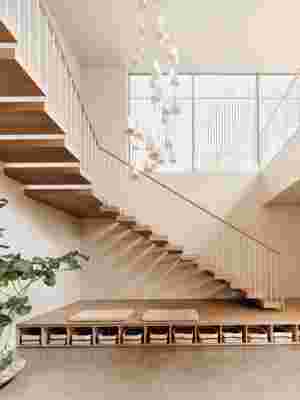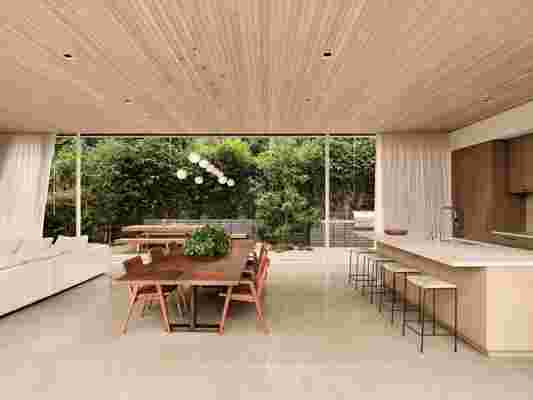Sometimes the most fruitful journeys are the ones that begin without a fixed destination. Consider the finely tailored modernist house that the Los Angeles architecture firm Woods + Dangaran designed for a real estate developer in the city’s Mar Vista neighborhood. Uniquely responsive to the exigencies of its site at the crest of a sloping hillside, the striking residence should finally put to rest the old canard that modernism is somehow inimical to warmth and comfort.
“Our client is a true collaborator. He didn’t have a preconceived idea of what this house should be,” explains W+D partner Brett Woods. “He was interested in our process, and he had enough faith in us to let the design emerge organically from that process.”
For privacy and security, the crisp, orthogonal structure presents a solid face to the street. The elevation is grounded by a plaster privacy wall, beyond which the second level of the two-story house seems to float. Slender cedar louvers break the otherwise symmetrical façade, offering a glimpse into the home while teasing the surprising sense of openness and transparency that unfolds within. “It’s really an enticement—something that piques your interest without giving away the whole story,” says partner Joseph Dangaran.

A double-height entry features a cantilevered stair set on a plinth that offers seating and shoe storage. The chandelier is by Bocci .
Working with landscape architect Chris Sosa , Woods and Dangaran plotted the house in relation to trees and plantings that soften the emphatically rectilinear lines of the structure. Outside the plaster privacy wall, the front yard is lined with a swath of oak trees and boulders. A small courtyard, planted with ornamental grasses and boulders set around a focal ginkgo tree, separates the garage from the private entry to the home, nurturing a feeling of decompression and refuge.
The garage access and the front door for guests both lead to the double-height entry volume, which is anchored by a dramatic cantilevered stair of oak treads set into walls skim-coated in velvety plaster. Here, as throughout the house, a pas de deux of shadow and light animates the restrained yet soulful interiors. “Instead of drywall and paint, we try to use natural materials and finishes to establish the color palette and the mood,” Woods notes, emphasizing the warmth of the composition.

Woven leather chairs by Smilow Design pull up to a David Alan Collection dining table of book-matched walnut in the dining area. Glass sliders open the space to a side garden.
Buy now for unlimited access and all of the benefits that only members get to experience.

As one proceeds into the house, the full scope of the architects’ indoor/outdoor alchemy reveals itself in a series of permeable boundaries and shifting planes. Massive pocketing glass sliders completely open the central kitchen, dining, and living room on two sides—one to a slender side garden, and the other to an ipe deck and pool. Subtle reveals between the interior cedar slat ceiling and the plaster walls buoy the lightness of the architecture, much like the flowing drapery treatments that temper the house’s hard edges and the stands of weeping Mexican bamboo—“They look like [the Muppet character] Snuffleupagus,” Dangaran jokes—that, once again, provide a lyrical counterpoint to the rigid hardscape.
Plenty of architects profess a begrudging interest in interior design, but Woods and Dangaran actually lean into the decorating aspect of their projects. “We love curtains. We love area rugs. We’re not afraid of a little fringe,” Dangaran insists. “These are the things that humanize our architecture,” adds Woods. Here, the duo orchestrated an assemblage of furnishings with an emphasis on beautifully textured natural materials and pale neutral tones, eminently complementary to the architectural scheme of distilled solids and voids.
“There’s no contradiction in building something modern and building something that people can live in,” Woods concludes. “You don’t need to sacrifice the virtues of comfort and graciousness to feel attuned to contemporary life.”
